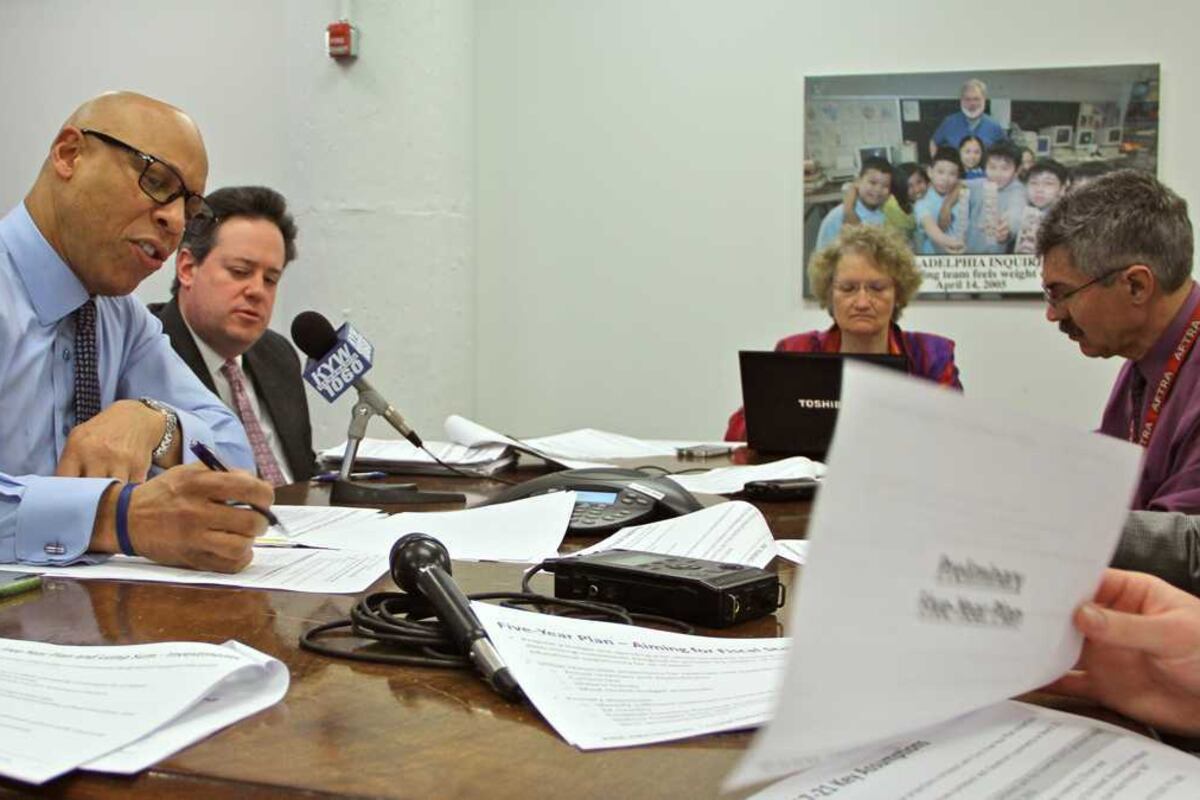A group of Southeast Pennsylvania school superintendents said Wednesday that the current funding model for charter schools is unfair and outdated, and that it diverts needed dollars away from their districts.
Payments to cover the cost of charters, especially cyber charters that are fully virtual, are forcing school systems to cut programming or push for tax increases in their districts, school leaders said during a press conference over Zoom.
“We’re maintaining maximum tax effort just to keep our programs going,” said Sam Lee, superintendent of the 6,000-student Bensalem Township School district in Bucks County. “If something doesn’t change relating to charter funding, options and opportunities for our students will be severely compromised.” About 100 Bensalem students are enrolled in cyber charters.
Superintendents said there are two main problems with the charter school funding system: Cybers receive the same amount as brick-and-mortar schools, even though they do not have the expense of maintaining a building. And charters get one amount for general education students and an additional sum for students with disabilities, which is the same regardless of the severity of their needs. Those payments can be double or even triple the regular education amount, and often exceed the actual cost of educating the students with disabilities enrolled in the charters, most of which have mild impairments.
Although Pennsylvania cyber schools have consistently performed poorly in state and national studies of effectiveness, about a quarter of the charter students in Pennsylvania are enrolled in cybers. And charter cyber enrollment increased during the pandemic by about 25,000 students.
“This is not just an urban issue,” said Jim Scanlon, the superintendent of the West Chester Area School District, which has about 12,000 students and a $270 million budget spread across small towns, suburbs, and farms. “In all school districts in the Commonwealth, tuition dollars are sent to poorly run charter schools.”
Under the Pennsylvania charter school law, which has not been significantly revised since it was first enacted in 1997, the reimbursement formula considers the district’s prior year per-student cost for general and special education students. For West Chester, the amount allocated for students with disabilities is more than double that of general education students — $34,000 compared to $16,000.
He said that providing speech and language therapy costs his district an extra $1,500 per student, not $16,000, which would be the cost of educating a student with complex medical needs or who is enrolled in a life skills class. Charter schools enroll very few students with severe disabilities.
“It’s like going into a restaurant and buying a hamburger, but being charged for a five-course lobster dinner,” Scanlon said.
State law does not require charter schools to spend the special education funding on those students.
In his proposed 2021-22 budget, Gov. Tom Wolf is recommending a uniform payment of $9,500 per student to cyber charter schools and a three-tiered payment system to all charters for students with disabilities, depending on their needs. While similar to the funding formula used to allocate state special education money to school districts, it will likely face opposition in the Republican-controlled legislature.
Philadelphia Superintendent William Hite had a conflict and was unable to join the Wednesday press conference, but said Thursday that he agrees with his fellow school leaders. Changing the special education funding formula alone would safe Philadelphia $52 million a year, he said.
About half the 170,000 charter school students in Pennsylvania are enrolled in Philadelphia schools. Both Hite and members of the Philadelphia Board of Education have long sought changes in the charter funding formula and are urging support of the governor’s proposed changes. More than $1 billion of Philadelphia’s $3 billion budget goes to charter school payments.
Lenny McAllister, CEO of the Pennsylvania Coalition of Public Charter Schools, a lobbying group, said the governor’s changes would cost charters $229 million. He said the proposal “only further highlights where the governor ranks the needs of Pennsylvania’s neediest students and their families: as second-class citizens.” Charter advocates say this because the regular education formula gives a smaller amount to charters than the host district’s full per-student cost.
He said that the governor and “special interest groups” are scapegoating charters for budget problems that are actually caused by rising teacher pension costs.
Scanlon and the other superintendents said they weren’t trying to end school choice.
“This is not about the competition” said Daniel McGarry, superintendent in Upper Darby, a diverse suburb adjoining Philadelphia. “It’s more about leveling the playing field.”
Under state law, Pennsylvania charters must be nonprofit, but they are allowed to have management contracts with for-profit entities. And some do, including several cybers.
“Taxpayers are funding a for-profit business … and it is not right,” said Stephen Rodriguez, superintendent of the Pottstown School District in Montgomery County.
“For most of the charter era, Philly has taken the brunt of it,” said Lawrence Feinberg, the director of the newly formed Keystone Center for Charter Change at the Pennsylvania School Boards Association, which organized the press conference. “But with COVID, all 500 districts got slammed with cyber charter tuition.”
The Center was established in an effort to get long-sought changes to the charter reimbursement formula “over the finish line,” said Feinberg, who is also the president of the Haverford Board of Education.





